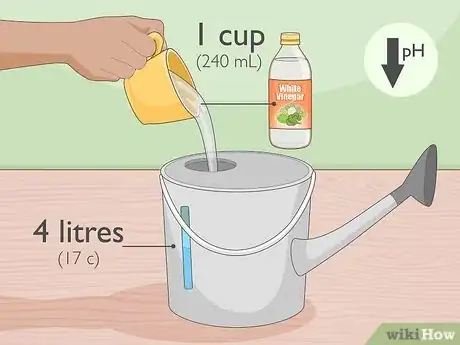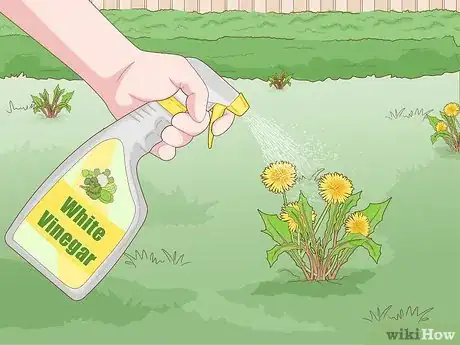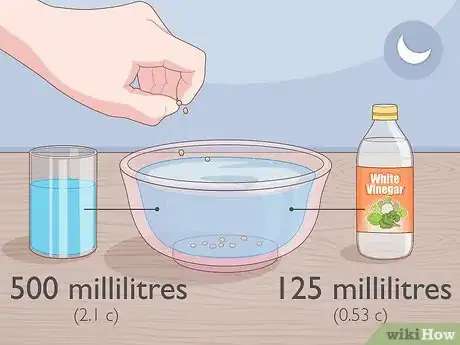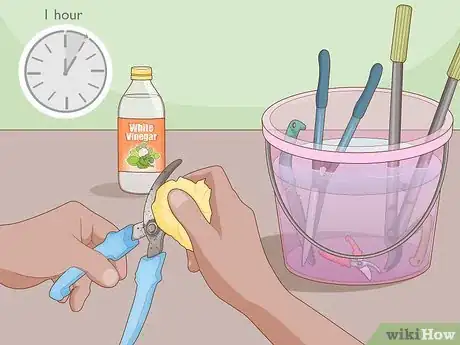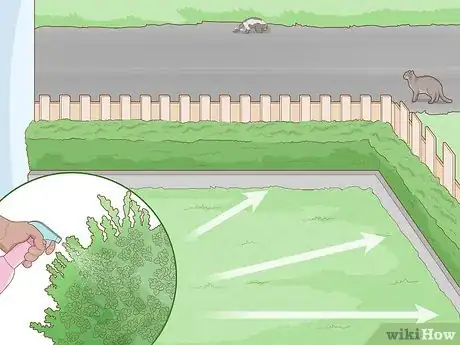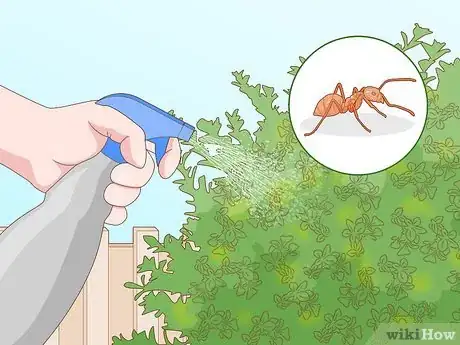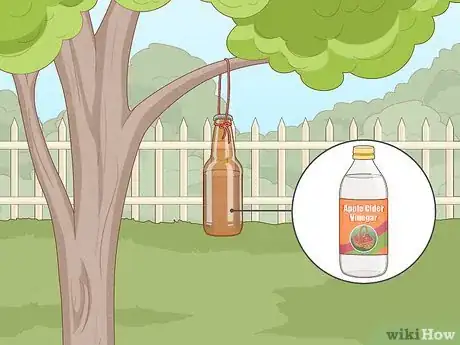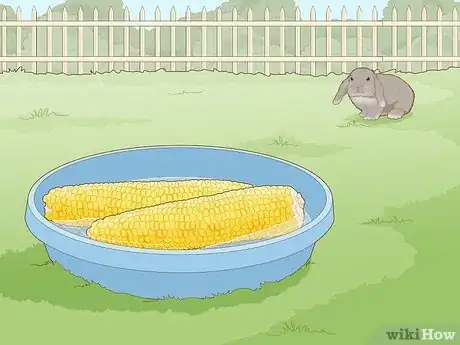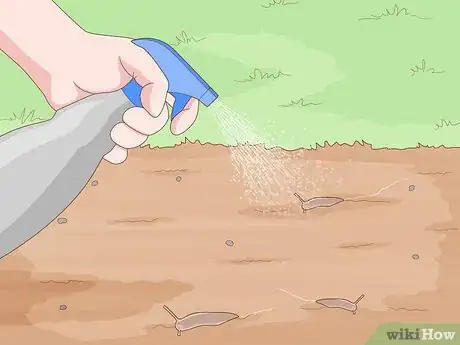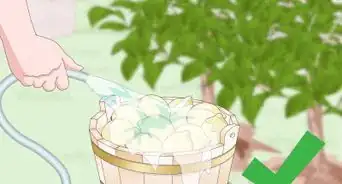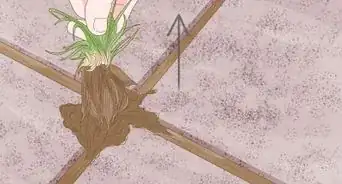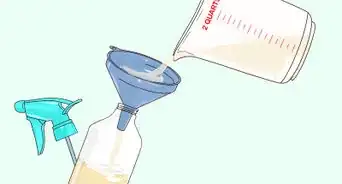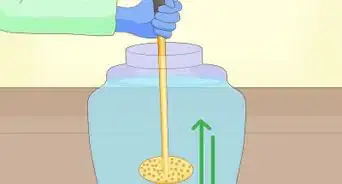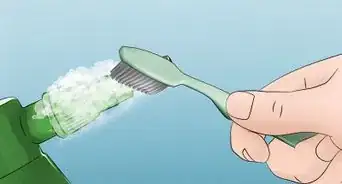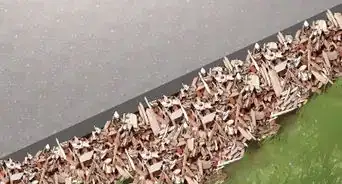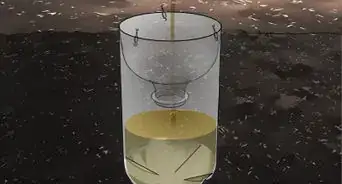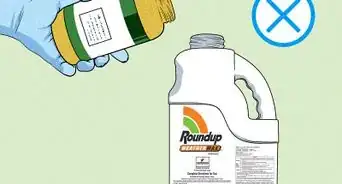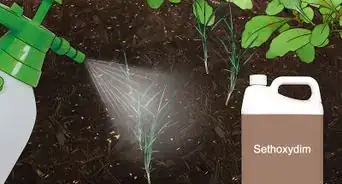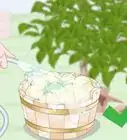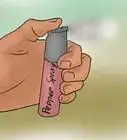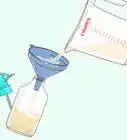This article was co-authored by wikiHow staff writer, Janice Tieperman. Janice is a professional and creative writer who has worked at wikiHow since 2019. With both a B.A. and M.A. in English from East Stroudsburg University, she has a passion for writing a wide variety of content for anyone and everyone. In her free time, you can find her working on a new crochet pattern, listening to true crime podcasts, or tackling a new creative writing project.
There are 10 references cited in this article, which can be found at the bottom of the page.
wikiHow marks an article as reader-approved once it receives enough positive feedback. This article received 12 testimonials and 84% of readers who voted found it helpful, earning it our reader-approved status.
This article has been viewed 239,875 times.
Learn more...
Vinegar is a useful cleaning tool that you can use both inside and outside your home! In your garden, you can strategically use this substance to protect your plants from a variety of creatures, like dogs, cats, rabbits, slugs, and ants. Additionally, you can use vinegar to improve the soil and germination in your garden. Try including this helpful liquid in your gardening routine and see if you notice a difference!
Steps
Maintaining Your Garden
-
1Add vinegar when watering plants to lower the pH of your soil. Combine 1 cup (240 mL) of white vinegar and 4 litres (17 c) of cool water together in a watering can or jug. Next, stir both ingredients together using a long utensil. Pour the mixture over your plant beds to lower the pH, which can help certain plants (e.g., azaleas, rhododendrons) to thrive.[1]
- Check if your plants grow better in an acidic environment before watering them with vinegar solution. If the plants do better in an alkaline environment, then the mixture could do more harm than good.
-
2Kill off any unwanted weeds with a few sprays of vinegar. Spray or pour vinegar directly onto the pesky, offending weeds that are plaguing your garden. If you want to use an all-natural weed killer before turning to a pesticide, try using pure white vinegar. Pour the liquid over the weeds until both the soil and plant are saturated with vinegar.[2]
- Be careful whenever you use vinegar. The acid in vinegar can cause serious bodily harm when concentrated more than 11%. Use eye goggles and gloves to prevent any injury.[3]
Advertisement -
3Soak seeds in a mixture of water and vinegar to speed up germination. Give your newly seeded plants a jumpstart by soaking them in a vinegar and water mixture before you plant them. Mix 500 millilitres (2.1 c) of water with 125 millilitres (0.53 c) of white vinegar in a bowl, and submerge the seeds in the mixture. Let the seeds soak overnight before planting them the next morning.[4]
-
4Clean your gardening tools with vinegar. Fill a large basin, tub, or bucket with undiluted white vinegar, depending on the size of your dirty garden tools. Submerge the items in the vinegar bath, letting them soak for at least 1 hour. Keep the tools in the mixture until they look dirt-free and clean.[5]
- You can also use white vinegar to clean hummingbird baths and clay pots.
Deterring Animals and Pests
-
1Spray vinegar to keep your outdoor pets away. If your pet likes to loiter around your plants, try spritzing the edges of your garden with white vinegar. Cover any surfaces near where your pet likes to prowl, as the smell will drive them away. Try and spray vinegar on a daily basis, or however often your pet goes through your garden.[6]
- Citrus spray and lemon peels can also work for this.
- Vinegar is also a great hazing option for scaring away coyotes. Consider filling a water gun with white vinegar and using it to spray any coyotes that wander through your yard.[7]
-
2Spritz around the edge of your garden to get rid of ants. Keep an eye out for any trails of ants entering your garden. Once you’ve figured out their main entry points, use a spray bottle to spritz vinegar over these areas. Continue inspecting and spraying these areas on a daily basis to keep the ants away![8]
- If vinegar doesn’t seem to deter the ants, you might have to use a different method.
- Vinegar is also a natural deterrent for spiders and other bugs.[9]
-
3Create vinegar fruit fly traps for your trees. Fill an empty beer bottle or tin about halfway with apple cider vinegar. Try several of these containers to different tree branches, and see if the fruit flies begin to go away! You might need to hang up more than 1, depending on the size of the plant.[10]
- These traps are especially effective with fruit trees and fruit-bearing plants.
-
4Leave out vinegar-soaked corncobs to keep rabbits from coming in your garden. Take several old corncobs and place them in a bowl filled with at least 1 cup (240 mL) of white vinegar. Make sure that the corncobs are completely submerged, so they reek with the scent and taste of vinegar. Place these corncobs in spots where the rabbits tend to frequent to give these rodents a sour surprise![11]
- If you don’t have enough vinegar to completely submerge your corncobs, spin them around in the bowl so all surfaces are coated with vinegar.
- Use as many corncobs as you need. If you have a small garden, you might only need 1-3 corncobs, while a larger garden might require more.
-
5Eliminate slugs with a squirt of vinegar. Get rid of slugs on sight by spraying them with a mixture of water and vinegar. Combine 1 cup (240 mL) of white vinegar with 0.5 cups (120 mL) in a spray bottle, and spritz the slugs with the solution. Once you’ve squirted the pests, dispose of them in waste bin.[12]
- If you suspect that there are slugs in your garden, look for a telltale trail of slime.
Community Q&A
-
QuestionWhat is the difference between garden vinegar and household vinegar?
 Community AnswerThey're the same kind of vinegar. The articles usually specify distilled white vinegar, which is usually considered plain vinegar. It is useful for household, laundry, cooking, and gardening applications.
Community AnswerThey're the same kind of vinegar. The articles usually specify distilled white vinegar, which is usually considered plain vinegar. It is useful for household, laundry, cooking, and gardening applications. -
QuestionWill vinegar get rid of tomato grubs?
 Community AnswerNo. Try planting basil around your tomatoes. Kill the grubs when you see them.
Community AnswerNo. Try planting basil around your tomatoes. Kill the grubs when you see them. -
QuestionHow do I get rid of a caterpillar?
 Community AnswerYou can remove the caterpillar to a new plant or spray the plant with a bit of salt water.
Community AnswerYou can remove the caterpillar to a new plant or spray the plant with a bit of salt water.
References
- ↑ https://www.bhg.com.au/10-ways-to-use-vinegar-in-your-garden
- ↑ https://www.bobvila.com/slideshow/9-natural-ways-to-kill-weeds-45747#mulch-weed-control
- ↑ https://www.goodhousekeeping.com/home/gardening/a20705796/vinegar-weed-killer-danger/
- ↑ https://www.bhg.com.au/10-ways-to-use-vinegar-in-your-garden
- ↑ https://www.baxtercountymg.com/monthly-newsletter/cleaning-garden-pots-and-tools
- ↑ https://www.alleycat.org/community-cat-care/humane-deterrents/
- ↑ https://www.humanesociety.org/resources/coyote-hazing
- ↑ https://www.baxtercountymg.com/monthly-newsletter/cleaning-garden-pots-and-tools
- ↑ https://www.apartmenttherapy.com/natural-pest-repellent-vinegar-257668
About This Article
You can use vinegar in your garden as a natural deterrent for insects and animals as well as to improve your soil. Try spritzing the edges of your garden with white vinegar to keep your outdoor pets away. It won’t harm them, but the smell of the vinegar will keep them from entering the garden area. You can also fill an empty can about halfway with apple cider vinegar and hang it from your fruit trees to trap fruit flies. To keep rabbits away, try soaking corncobs in white vinegar and then leaving them out. When the rabbits bite into the corn, the sour flavor will keep them from coming back for more. Another great use for vinegar is to lower the pH of your soil. Just combine 1 cup of white vinegar with 4 liters of water and water your garden with it. To learn how to kill weeds in your garden with vinegar, keep reading!
